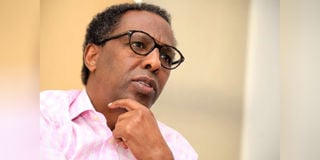
Lawyer Ahmednasir Abdullahi.
One doesn’t think of a censor when the idea of the Supreme Court comes up. We’d like to think of the highest court in the land as a temple of justice, the pinnacle of the rule of law – just, fair, deliberative, and faithful to the Constitution.
However, that’s not always been the case, even for the hallowed Supreme Court of the United States.
I painfully recall the Dred Scott vs Sanford in which the US Supreme Court decided in 1857 that the US Constitution didn’t grant citizenship to Black people of African descend nor the rights conferred on American citizens. In Kenya, the Martha Koome-led Supreme Court hasn’t gone that far. But it’s recently shocked us.
Where, for example, the Constitutional Court of South Africa is the conscience of democracy in the post-Apartheid era, the Koome Court has often gone in the opposite direction. Rather than act as the defender of the Constitution and the guardian of democracy, the Koome Court is proving to be a handmaiden of less noble causes.
Thin-skinned and extremely prickly, the Supreme Court has sometimes been acting with impunity and arrogance. Who can forget, for instance, the Koome Court’s gratuitous humiliation of Azimio in the 2022 presidential election petition? It was a judgement filled with calumny, hatred, and filthy epithets. It was the Court’s lowest moment.
I think the Koome Court was flatly wrong on the law with its weak-minded take on the Constitution. A court’s power lies in its moral legitimacy because of the probity and high-mindedness of its judgments. It’s after all, the cartilage that stands between state tyranny and the people.
When the Court abandons that role, it becomes an instrument of fascism. There was palpable bromance between Kenya Kwanza and the Court immediately after the Court’s ruling favouring the coalition. That honeymoon between the judiciary and KK is over now after adverse rulings of lower courts on government policies. CJ Koome is now like deer caught in the headlights.
The Koome Court is at risk of becoming irrelevant. A chief justice should be the political leader and intellectual inspiration of the Court. She must have the heft, even if she’s not a scholar, to lead with emotional and moral intelligence.
That’s because the Court must remain the conscience of the nation. That’s why I was flabbergasted by the folly of the top Court when it flippantly issued a ban on Senior Counsel Ahmednasir Abdullahi. Mr Ahmednasir isn’t a saint by any stretch of the imagination. None of us is. But he isn’t the monster the Court paints him to be. Mr Ahmednasir’s greatest sin is calling out the judiciary, especially the Supreme Court, on corruption.
In Kenya, even the chickens in the village, know there is a corruption problem in the Judiciary. A proper forensic audit of judges and other judicial officers and staff would find that the many couldn’t justify their wealth. There’s a Kenyan saying – why hire a lawyer when you can buy a judge? There are those who act with impunity and demand bribes.
They do so in cahoots with the private bar, commercial interests, and the two political branches. But it’s most tragic the Judiciary – the branch entrusted with being the guardian of legality – has people who lead in law-breaking. It’s a catastrophe when that same branch squelches its critics who point out corruption within its ranks.
I found it very strange that rather than take Mr Ahmednasir’s charges of corruption seriously and investigate them to the fullest, CJ Koome instead became defensive. In contrast, former CJ Willy Mutunga admitted that the cancer of corruption was killing the courts.
There are piles of reports on corruption in the Judiciary. The problem is undeniable. So it’s very rich for the Judiciary to taunt whistleblowers to come forward with evidence of corruption if they have it. That’s the textbook definition of bogus. If the CJ and the Judicial Service Commission don’t have evidence of corruption, then we don’t need them in office. Are they admitting complicity by their denialism?
Mr Ahmednasir is simply a messenger, the voice of the voiceless. He’s one of Kenya’s most senior lawyers. He has intimate knowledge of the workings in our justice system. When he speaks, we all should listen, including those who loathe him.
Gagging him isn’t the answer. You don’t win an argument by silencing the opponent or the dissenter. Nor is it a privilege for a lawyer to appear before any court. That’s a right which is central to democracy. Judges don’t have to like or love lawyers. That’s not how democracy works. Nor is the CJ presiding over a family conclave where she can silence her children. Lift the unconstitutional ban on Ahmednasir!
- Makau Mutua is SUNY Distinguished Professor and Margaret W. Wong Professor at Buffalo Law School, The State University of New York. @makaumutua.










